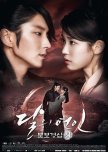
Moon Lovers: Scarlet Heart Ryeo
304 mensen vonden deze beoordeling nuttig
Deze recentie kan spoilers bevatten
MLSHR is among a small number of k-dramas that have left a deep impression on me, yet it's also a drama I'd hesitate to recommend to people at large. There are a couple of reasons:(1) The extent to which you'll enjoy this drama depends on whether you value IDEAS or EXECUTION. If you're the second kind of viewer, this show may drive you mad. The general consensus is that Scarlet Heart: Ryeo had a great story that was screwed up by messy editing/directing/pacing etc. and not enough space to tell it (20 episodes compared to the original 35-ep C-drama). I'm very sympathetic to this assessment.
However, I'm also the kind of viewer who will forgive a lot of flubbed execution for a really good idea, which this drama has in spades.
Scarlet Heart Ryeo is above all an *ambitious* drama, probably excessively so. The upshot is that it has possibly the most uneven execution and post-production editing ever committed... but at the same time some of the most complex and compelling character arcs I've come across in kdrama. It's not for nothing that the show has drawn such an unusual amount of discussion and fannish activity, especially internationally. (MLSHR was poorly received in Korea, but it is/was a certified international sensation, the first ever kdrama to make Tumblr trends, etc.)
(2) My other "disclaimer" for MLSHR is that it has a deeply cynical and subversive approach to romance. If you're looking for a fairytale where love conquers all, this is not the show for you. If you're looking for a classic tale of star-crossed lovers foiled by evil external forces... this is still not the show for you.
If, on the other hand, you're the sort to appreciate tragic missed opportunities of love driven by bad timing and fatal ***character flaws***, then Scarlet Heart: Ryeo is the Greek tragedy of your dreams (and/or nightmares). In a market saturated with wannabe Pride & Prejudices, Scarlet Heart Ryeo is out here being a totally unapologetic Wuthering Heights, which is pretty gutsy for a YA reverse-harem premise. (To be fair, they were working off of the Chinese novel, but they *could* have made it more public-friendly.)
Here's the bottom line: This drama is an acquired taste. If you're not a fan of tragedy or bloodbaths, if you need your female characters to be ~empowered~ and save the day, if you prefer people in love to be functional and communicate well — look elsewhere.
However, if you enjoy nonstop political scheming and backstabbing, majority-villain ensembles (including both male leads, arguably), and romantic narratives that reject relationship = identity myths, Scarlet Heart Ryeo is probably up your dark and twisted alley.
Vond je deze recentie nuttig?
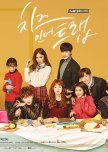
Now that we've got that out of the way: Despite unevenness, Cheese in the Trap is a narrative success in my books, for many of the same reasons I've also defended that other 2016 YA drama with a bad reputation, Scarlet Heart: Ryeo. (Speaking of, MLSHR is one of the recs under CITT because it, too, has a "questionably crazy male lead." Hilarity.)
Anyway, k-drama romances tend to fall under two trends:
(1) Zany Disney-esque romcoms where love lifts everyone up where they belong (see: My Girlfriend is a Gumiho, To the Beautiful You, You Who Came From the Stars, etc. etc. etc. etc.).
(2) Toxic and imbalanced relationships that are glorified with undeserved happily-ever-afters (see: Boys Over Flowers, The Heirs, and so on and so forth).
Cheese in the Trap isn't either of those stories. Much like MLSHR, CITT is concerned with one overarching question: Can a person change another person? (Alternatively: Do people change *for* other people?) The show doesn't give a pat answer, and that's to its credit.
In short, this is a slice-of-life that isn't afraid to go dark (and not in an incongruous after-school special way — unlike Age of Youth, the darkness in CITT is fully fleshed out). If you're looking for light, escapist fun that delivers a straightforward message, there are literally hundreds of other dramas for you. If, otoh, you want a complex story about young adults that doesn't idealise its characters — but also, importantly, doesn't descend into nihilism — you might want to give Cheese in the Trap a shot.
Vond je deze recentie nuttig?
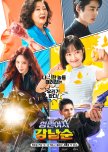
Strong Girl Kang Nam Soon
14 mensen vonden deze beoordeling nuttig
Deze recentie kan spoilers bevatten
Totally incoherent “morality tale”
I’m writing this review partly to try to make sense of what I’ve just watched. I have NEVER seen a kdrama fumble it like this series did, to the extent that I genuinely wonder whether there was outside-the-story/corporate control influencing the story.We all know the premise of (most) kdramas. There is the female lead, the male lead, second male lead, and often there is also a villain. The female lead and male lead are the OTP who are usually going to end up together, and their relationship gets the most focus. Second male lead doesn’t really stand a chance but he will get some other kind of happy ending. Villain is evil so they will be punished. You’re following me so far, right?
Now, for some reason, the writer of Strong Girl Nam Soon decided to spice up this formula, which is not a problem in itself — the problem is that the resulting story is totally incoherent. It is an insane choice to push your first male lead off to the sidelines and instead place the whole story/conflict/narrative drive between your female lead and “second male lead” who, in this drama, is actually the romantic villain. Meanwhile, the actual supposed main couple have barely any screen time together for the majority of the show (this is NOT an exaggeration), let alone any relationship conflict which is bizarre considering kdramas LOVE romantic melodrama. As you can see from most of the reviews here, this leads to the audience not being invested in the main couple and instead being more interested in the female lead/villain enemies-to-lovers storyline — only then to be disappointed by the show reverting to the status quo of hero+heroine 4ever.
There was literally no reason for the drama to do any of this, mind you. There was no *need* per se for the heroine versus villain storyline to become romantic — it could have just been about Namsoon trying to infiltrate the corporation and find out Ryu Sio’s secrets, while he becomes obsessed with her super-strength etc. without necessarily any romantic overtones. And yet, the show actually goes out of its way to put UST into this dynamic in the writing/acting AND direction, not to mention dedicates a really substantial amount of screen-time to female lead basically dating the villain (again, NOT an exaggeration).
Meanwhile, the ostensible male lead has no character arc, no internal conflict, and no actual flaws to overcome. The only significant things we know about him are 1) he’s a cop, 2) he had a brother who was shot, motivating him to become a cop, 3) he gets upset when his boss dies from the drug because it reminds him of his brother dying. This is all groundwork for character development that never actually emerges. He also likes and is overprotective towards Namsoon, but feels emasculated by her carrying him (booooooo get over it, you will never be Minhyuk).
The writing for the female lead is also disappointing. After reuniting with her birth family, Namsoon’s character development basically stops and there is no clear character arc where she has to question her beliefs/overcome her flaws. Some have commented here that they were disappointed Namsoon doesn’t try to help/sympathise with Ryu Sio. Firstly to be clear, Namsoon isn’t obliged to help someone who is actively trying to kill her family. That being said, I think the disappointment from viewers comes from the writer fundamentally misunderstanding the hero/villain archetypal relationship. The villain exists to challenge the hero, drawing attention to their similarities as well as differences; they are two sides of the same coin. In SGNS, Namsoon challenges Sio in that she taps into his heart which was long unused. However, for Namsoon, there is no point in the story where she questions herself/her own life/her beliefs due to her relationship with Sio. The only time that she acknowledges their similarities (i.e. being “adopted” one way or another) is after his death; imagine how much more compelling this would have been if she actually struggled with this internally while actively manipulating him. However, the writer isn’t interested in giving Namsoon any real struggles or flaws to overcome. She is meant to be a Strong Female Character (TM) and ultimately the embodiment of the show’s anti-drug/copaganda message.
As many here have noted already, Ryu Sio is the only one of the main characters who is well-executed — and this is because he is the only character with clear goals, clear flaws, a clear back-story motivating his present actions, clear vulnerabilities, AND a fully realised character arc (albeit a tragic one). It is therefore absolutely no surprise that his character is the most popular/beloved. I have a theory that Ryu Sio was the writer’s favourite too, as they actually put effort into his character while neglecting virtually everything else about the show. And it has to be said that Byeon Woo-seok kills it. He is both chilling and devastating and has The Range. Probably the best scene that demonstrate this is when he shoves a golf club down some guy’s throat then in the next breath calls up Namsoon with a completely different demeanour to ask how she’s doing and say he misses her. Now THAT’S a character.
IN CONCLUSION, this drama is a wildly uneven mess that seems mainly to exist as a ham-fisted PSA about drugs, which backfires as the drug lord is the most beloved character among viewers.
Vond je deze recentie nuttig?
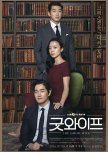
With regards to plots, K-TGW is a serious stickler to the original in ways that should thrill any Good Wife purist. It's abundantly clear the writers/producers *themselves* are highkey stans for TGW in light of the attention to detail in every reproduction of the original's greatest courtroom hits.
K-TGW also deserves praise for being a masterclass in pacing. For those unaware, the drama spans *three seasons* of the original within 16 episodes. 16 EPISODES. Yet, by some level 10 sorcery, all major character/relationship arcs are completely cohesive.* Particularly, the transformation of Hyekyung (Alicia Florrick's counterpart) is absolutely seamless.
(*The one glaring exception is the last act of the finale, which is weirdly ambiguous in a way that seems rushed rather than purposeful.)
Maybe most importantly, the drama also stays faithful to the bisexuality of Nana's character, which was my #1 priority when I heard news of the remake.
Where Korean TGW diverges from American TGW is in being a lot less cynical. This isn't a value judgment. I for one like my TV cynical, and I was honestly delighted by the corrosion of Alicia Florrick in the original's later seasons. Others hated it. Many read The Good Wife as a story of female empowerment and were not here for their heroine becoming a bad person and ending up alone. But I don't need female protags to be role models who can """represent""" every woman. I just need them to have fully realised journeys.
In that sense, the Korean version takes the story back to its roots. Whereas American TGW built Alicia up and then tore her down, K-TGW portrays the rise of Hyekyung and makes that a self-contained story. The drama also fleshes out a proper redemptive arc to Joongwon that would make his blithely amoral American counterpart Will Gardner roll over in his jewel-encrusted coffin. Speaking of which: Alicia/Will was a tragedy of epic Greek proportions; Hyekyung/Joongwon is not. (Naturally, I was much more ruinously attached to the former. YMMV.)
Meanwhile, Yoo Jitae's character is both more villainous and more appealing than Peter Florrick has ever been. Let it be known there was never any Peter stan-base to speak of. Yoo Jitae, OTOH, probably deserves one.
I wouldn't necessarily call these changes an improvement per se. A happier story doesn't always equal a better one (just as a more grimdark story =/= more mature). The strength of storytelling is what really matters.
What K-TGW does, though, it does very well. Whether you're familiar with the source material or not, this is one of the best dramas of 2016.
Vond je deze recentie nuttig?
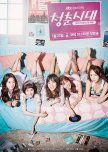
Of course, there are plenty of great k-dramas out there where women drive the plot; in those stories, though, the female protags usually share equal space with male leads. And there are a few gems I've come across that aren't about romance, but these examples are very much male-driven (Misaeng, SUFBB, White Christmas — all of these shows respect their women, but none of them are *about* the women).
Age of Youth, however, is an anomaly in revolving around a main female ensemble with all male characters being pushed down to supporting character rank (just check out the cast list here). This is in itself is a little bit momentous, and it's the kind of thing there should be more of.
Don't get me wrong, in general you can count on k-dramas for female characters with points-of-view. Still, the bulk of them follow the YA novel tradition of revolving around *one* girl, meaning that relationships between different women are rarely fleshed out (or at least, not as fleshed out as that of the female lead/male leads). Age of Youth, however, isn't about one girl. It's about five girls — five girls with their own inner lives, goals, and ghosts-in-the-closet (thanks to Jiwon for that unnecessarily dramatic metaphor). These stories might feature romantic subplots, but they're not the main event. The way these girls relate to one another is the real emotional core of the series.
Since I've sung my praise, for the sake of fairness I'll touch on a couple of the show's weaknesses.
Being such a short drama, AOY is definitely hurt by trying to do too much with a lack of time. The upshot is it suffers from the typical ensemble show problem of uneven character work. While some arcs are fully realised and flawlessly constructed (particularly, the growth of Hwayoung's character), a couple of others sadly fall to the wayside. (Han Seungyeon's character is the most egregious. If I didn't know there'll be a season two, I'd find the lack of time given for Ye Eun's post-traumatic arc absolutely unforgivable. Since there *will* be a season two, though, I aggressively expect this to be the #1 priority.)
My other gripe is about tonal inconsistency. Again with the trying to do too much, AOY teeters between realistic slice-of-life and... dark psychological thriller? Let it be said that it's much more successful at the former. Some of the darker story-lines work because they're *character-driven* (again, not sorry about Yina's narrative), but most of the show's dips into other genres are unfortunately half-baked. Considering that lack of time thing, AOY would have been more cohesive by cutting the excess.
THAT BEING SAID, these flaws stick out only because AOY is so quality in every other way. If you want a drama that actually cares about women's stories (and why wouldn't you), you arguably can't do better than Age of Youth.
Vond je deze recentie nuttig?
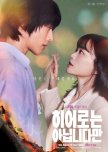
Although I Am Not a Hero
1 mensen vonden deze beoordeling nuttig
Deze recentie kan spoilers bevatten
The hold this drama has on me needs to be studied.
This drama got to me, okay. To demonstrate how much it Got Me, I can tell you that when I finished watching it I immediately started rewatching.There are two pivotal, wrenching moments in this drama that illustrate the magic of this story and the emotional impact it had for me:
- The end of episode 5, when Gwiju finds Dahae locked in the room and she thinks: “a hope I didn’t deserve quietly emerged in my heart.”
- The climax of the finale, when he finally saves her from the fire and tells her: “This isn’t the end, it’s the beginning” — knowing he will die in the next moment.
These two moments, besides being traumatically romantic, encapsulate what this story is about — healing and transformation. In just 12 episodes The Atypical Family delivers satisfying character arcs for virtually its whole ensemble, and it says that redemption and healing from your past traumas is possible. This is exemplified perhaps by Gwi-ju’s character: a man who starts the series shutting himself off from the world because he is unable to cope with his failures; only after letting go of his endless grief, repairing his relationship with his family and daughter, and making the choice to love again, does he reach self-actualisation and becomes the person he longed to be since he was a boy — a hero who can save someone’s life. This is a masterclass of a character arc.
I can say the same for Dahae, an actually complex female lead who in any other kdrama would be portrayed as a conniving bitch villain; this drama actually says that in spite of her crimes, she deserves to find a family who loves her, and she deserves to be saved.
That is in essence the message of the drama — we do deserve to be saved from a burning building, and start again.
My one and only beef with this drama is the fat suit — as other reviewers have expressed, it is disappointing that kdramas still won’t cast plus-size actors. This arguably diminishes what is otherwise a beautiful character arc about Donghee finding self-acceptance and learning to fly again.
Still, on the whole, this drama left an indelible imprint; there are moments from this that I will probably remember forever.
Vond je deze recentie nuttig?


